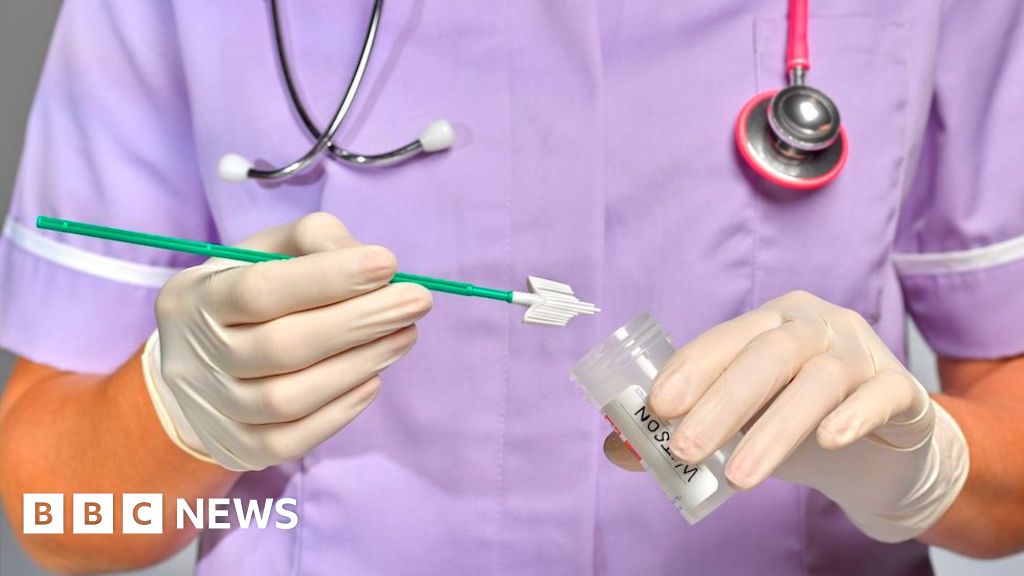Women who have delayed coming forward for cervical screening will be offered a test to be taken at home, NHS England has said. The DIY test kits, available from January, contain a long cotton-wool bud to swab the lining of the vagina. The test is for human papillomavirus (HPV), which causes most cervical cancers, and women between the ages of 25 and 64 are offered it every few years. But more than five million women aren't up to date with the test, according to the government. The Department for Health and Social Care in England said the scheme would tackle "deeply entrenched barriers" that keep women away from cervical screening. This can be due to embarrassment, discomfort, lack of time as well as religious or cultural concerns. Just 68.8% of women currently take up the offer of cervical cancer screening - well below the NHS England target of 80%. Younger women, those with a disability, ethnic minority communities and LGBT+ groups are more likely to miss appointments. A recent trialshowed the rollout of home test kits across England could increase the proportion screened to 77% over three years. The Department of Health said women who had rarely or never attended cervical screening would be offered a self-sample kit to complete at home. The kits are sent out "in discreet packaging" and the return postage is pre-paid. The test checks for HPV alone, but if that's detected then women will be invited for to see a doctor who will check for cell changes which could indicate cancer. Health and Social Care secretary Wes Streeting said: "We know the earlier cancer is diagnosed the better the chances are of survival. "By making screening more convenient, we're tackling the barriers that keep millions of women from potentially life-saving tests." Michelle Mitchell, chief executive of Cancer Research UK, said "beating cervical cancer means beating it for everyone" adding that at-home testing "helps to bring us closer to that goal". Hazel Stinson, 49, from Kent, suffers from chronic fatigue syndrome and was last able to visit the GP for a cervical screening six years ago. She says she is "absolutely thrilled" that at-home testing is being rolled out across England. "This will mean that I and millions of other people just like me will be able to have the test when otherwise they might not be able to do it," she added. Ms Stinson said as someone with chronic fatigue, which is also known as myalgic encephalomyelitis or ME, "the most important thing is to advocate for yourself". She says she has always been left "feeling fearful" that her inability to attend the GP regularly for tests like cervical screening could really affect her health. "I'm unwell enough as it is - I really don't want anything else on top of this," she explained. NHS England recently announced a separate change to the timing of cervical screening invitations. If women aged 25-49 have a negative test for HPV from this summer,they will wait five years until their next screening appointment instead of three. Research shows they're at very low risk of cervical cancer and can safely wait longer to be screened again. Source:NHS
At-home cervical screening tests offered in England
TruthLens AI Suggested Headline:
"NHS England to Introduce At-Home Cervical Screening Tests for Women"
TruthLens AI Summary
NHS England has announced the introduction of at-home cervical screening tests aimed at women who have not kept up with regular screenings. Starting in January, these DIY test kits will allow women aged 25 to 64 to conduct a self-sample test for human papillomavirus (HPV), the primary cause of most cervical cancers. The initiative comes as a response to alarming statistics indicating that over five million women in England are overdue for their cervical screenings. Many of these women cite various barriers, such as embarrassment, discomfort, and cultural or religious concerns, that prevent them from attending appointments. Currently, only 68.8% of eligible women participate in cervical cancer screening, falling short of the NHS England target of 80%. The government hopes that providing a more convenient option will help increase participation rates, especially among younger women, those with disabilities, ethnic minorities, and members of the LGBT+ community, who are disproportionately affected by low screening uptake.
The at-home test kits will be sent in discreet packaging with pre-paid return postage, allowing women to complete the test in the privacy of their own homes. If the test detects HPV, affected individuals will be referred to a healthcare professional for further examination to check for any cell changes that could indicate cancer. Health and Social Care Secretary Wes Streeting emphasized the importance of early cancer detection for improving survival rates and stated that making screening more accessible is crucial to overcoming the barriers faced by millions of women. Additionally, Cancer Research UK's chief executive, Michelle Mitchell, highlighted that at-home testing is a step towards ensuring that cervical cancer prevention measures are effective for all demographics. Personal stories, such as that of Hazel Stinson, who has chronic fatigue syndrome, reveal the positive impact of this initiative, as it allows those with health challenges to participate in essential health screenings they might otherwise miss. Furthermore, NHS England has adjusted the scheduling of cervical screening invitations, indicating that women aged 25-49 with a negative HPV result will now wait five years for their next screening, reflecting research that shows their low risk of cervical cancer.
TruthLens AI Analysis
You need to be a member to generate the AI analysis for this article.
Log In to Generate AnalysisNot a member yet? Register for free.
